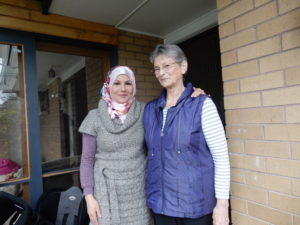Asylum seeker finds a home in the ‘burbs
For Lebanese asylum seeker Salam Assaad, it has been a long and surprising journey from Beirut to Boronia.
The mum of four is living in the ‘white-bread belt’ suburb in Melbourne’s south east – and her’s is one of the very few culturally and linguistically diverse families in the neighbourhood.
But she says she has been embraced by her neighbours who are curious about her culture and are eager to help.
Salam says she has made many friends in the area; every morning she walks her children to the local school with other mothers and frequently has neighbours over to visit.
“All my neighbours come and visit me, all Australian people. They ask me to come to their home and drink coffee,” Salam said.
“Very nice people – in my country you never find people like this.”

Salam and Ria
And a couple of her best friends are her landlords.
Salam rents the front half of a six-bedroom home from a couple who have lived in the house for over 40 years; and Ria and Peter Parlevliet have become family.
She and her children fled Beirut back in 2013, as fighting between rebels and government forces in Syria spilled over into her district.
She had lived in fear for her three young children, who were all under the age of five at the time.
“I thought to myself ‘what is this life?’ this is very bad for my children. All the time my children were screaming and not able to sleep at night time,” Salam said.
Salam and her husband made plans to move the family to Australia, but his three-month notice period at work was prolonging their departure.
“So my husband said ‘okay you go now with the children and I will follow you,’” Salam said.
“But my boat was the last boat. My husband cannot come now.”
Salam, who was eight months pregnant at the time, made it safely to Christmas Island with her children. After giving birth to her son, Ahmed, the family were finally resettled in Melbourne’s west.
Now on a bridging visa, Salam says living in Australia provides her family with many more opportunities.
She can’t believe how accessible public transport is or that an organisation would offer her fee assistance to continue her studies.
“Here life is too easy, too many people help me,” Salam said.
“I need a good life for my children, this is all I need.”
Salam studied nursing and worked in aged care in Lebanon, and hopes to eventually do the same in Australia.
Despite the difficulties of being a single mother, she has completed an online child care course, gotten a Working with Children card and is now registered as a family day care worker.
Missing her husband terribly, and seeing how her children miss their father, Salam says studying keeps her mind busy with positive thoughts.
“Every day my children ask when their dad is coming in an airplane. Every night I must explain to my children, one day he will come,” she said.
“My second youngest child, Aya, asks a lot of questions. She says ‘I want to wake up in the morning and see my dad’. We used to all sit all together for breakfast.
“She’s thinking he left us, but she’s just four.”
In November last year, Salam was connected with the Parlevliets who agreed to rent the front half of their house.
Ria and Peter had room in their large six-bedroom house to accommodate another family.
Involved in the community, and volunteers of a bridging asylum support program, they decided that they wanted to offer the space to an asylum seeker family in need.
So in November 2015, Salam and her four children moved in.
The front half of the house is completely self-contained and includes a kitchen, lounge room, three bedrooms, bathroom, laundry, and undercover terrace.
Ria says it took Salam a while to settle in but the children thrived in their new home and neighbourhood from day one.
“Now Salam knows we are genuine. We are good friends,” Ria said.
“It’s been a wonderful experience, a very positive experience,” she said.
With rent being much more affordable than what she was paying in Sunshine, Salam says this helped her a lot.
“I feel like they are my family – very nice people, very nice,” she said.
The four children call Ria ‘Oma’ as her own grandkids call her; she is a mother of five and grandmother of 12.
And just like an Oma, Ria looks after the youngest children if Salam has an appointment and disciplines them as she would her own grandkids.
Salam often cooks extra food to bring over to Ria’s half of the house.
“She is very hospitable, even though we insist we have our own food,” Ria said.
Salam has started a three-week placement in early childhood; for a few days a week she looks after two children along with her two youngest, while her older two children are at school.
“The mother brings her children to my house because she knows I don’t have a car. But I recently got my learning permit and am practising so I hope to be able to drive soon,” Salam said.
Salam walks her children to school with many of the local families and says her children love the local school.
“My oldest daughter has too many friends at school, she’s too happy”, Salam said.
“If I pick up my children early from school, they cry ‘why?’.”
Carissa Gilham
AMES Australia Staff Writer












